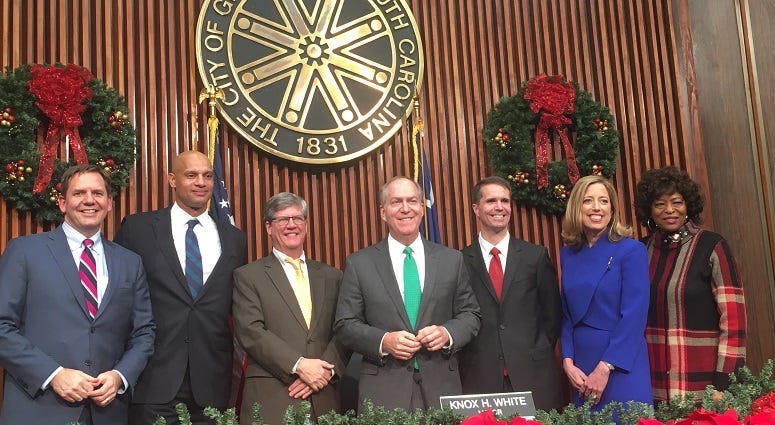
The Greenville City Council approved the zoning plans for the Greenville County Square Project at Monday night’s City Council meeting.
This ordinance rezones about 40 acres in downtown Greenville to the project, and there’s a lot more to the project’s plan than just this rezoning.
“It’s a far better project now than when it started,” said Mayor Knox White. “We addressed affordable housing, we took steps to ensure design oversight and also of course a very extensive traffic plan. So all of that’s a lot better than when we started, and we appreciate the chance to work together with the county on that project.”
White said he and the council made sure to make the plans for the project more “urban” rather than “suburban”. They reduced the planned square footage of the project and made sure that it would be a “walkable, people focused place.”
The only person to vote against the plan was councilwoman Dorothy Dowe, and she vocalized her concerns with the rest of the council before the vote.
She said there were several issues she had with the plan and the unknowns it failed to tackle in writing, including transportation and community input about the project.
“There are just a lot of unknowns, and it being such a big, big project, the biggest one we’ve ever seen or will see for the next 20 years,” Dowe said. “A lot of that could have been established before voting on it.”
The master plan for the project is actually still being written up. The vote for the rezoning was likely made now, in part, for financial reasons.
The county council previously voted to approve the funding for the project. The funds being used for the purchasing of the property are in bonds, and it takes an average of 60 days to rate and sell those bonds.
This means the votes on the funds and the approval of the city council in zoning the land had to be done by Monday. Otherwise, there wouldn’t be enough time for the bonds to be approved and sold by the April 1st property purchase deadline, and the $3.5 million down payment made on that property would have been lost.
Find more detail on this here.
But now that this rezoning plan has been approved, what’s next?
Councilwoman Dowe says her plans are to work to keep the community informed and engaged with the project.
She also said she wants to make sure “that we have engagement opportunities, both with the county and the developer, as was committed to verbally. I hope I’m proven wrong, and I hope they hold to that. But time will tell.”
Part of the approved plan allocates about seven million dollars to affordable housing, which Councilman Ken Gibson greatly pushed for.
Two million of these funds are coming from the developer, while the other five million dollars come from funds re-allocated in the plan by the county.
Gibson discussed this topic just before the vote to explain some of the background and express his thoughts on the matter.
“We’re going to end up with about seven million dollars of money for affordable housing,” Gibson said. “That’s about four or five times what our budget is right now. So that number is huge for us.”
Gibson later explained that this money can be invested in order to qualify for federal and state programs that will bring in more money for more affordable housing units in the city.
He continued that the project will unfortunately cause a lot of gentrification, and his plan for dealing with this is to build plenty of affordable housing to counteract that.
“The other alternative was just to let the county develop the project, not get seven million dollars, not get the traffic mitigation money, not get the control that we do have over the project,” Gibson said. “And given that alternative, I think what we passed today was an excellent compromise.”
This echoes Mayor White’s belief that the plans for the county square project are much better for the city of Greenville and its citizens because of the co-operation and involvement from the city council with the project.
Councilman Gibson probably put these thoughts best in his comment before the vote, “It’s not perfect, but it’s better.”
